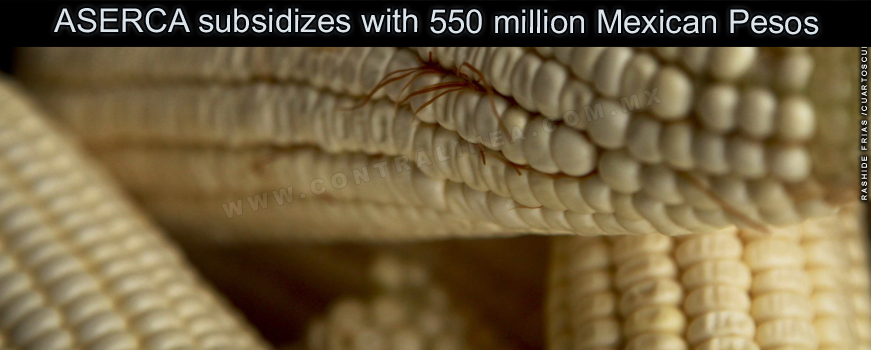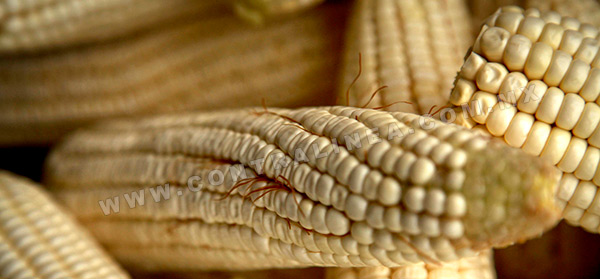



Maseca, Minsa, SuKarne, Sabritas and Bachoco are only some of the 48 companies that benefited from the “incentives” to buy corn. The public funds assigned in 2014 and in the first semester of the current year ascend to 610,347,126 pesos, as reveal official documents of the Services Agency for the Commercialization and Development of Agricultural Markets (Aserca).
To this same office, a decentralized body of the Secretariat of Agriculture, Livestock and Rural Development, Fisheries and Food of Mexico (Sagarpa), responsible for distributing the federal supports, arrived as its head Alejandro – with Vázquez Salido, who had been in charge as Director-General of Communications and Institutional Relations of the Maseca Group (Gruma) –from March to December 2012-. “”The global food company” owner of Maseca is the main beneficiary of the federal government.
In the midst of a crisis in the agricultural sector, over 610 million pesos are concentrated in nine companies. 91% of the “incentives”, i.e., 549,903, 854 pesos- with support over 130 million and even beyond 200 million for each company-, are distributed at: Compañía Nacional Almacenadora (subsidiary of Maseca), Minsa, Comercializadora Granos Patrón, Comercializadora Columbia, SuKarne Agroindutrial, Agro Servicios, Productores del Valle, Hari Masa, Multigranos Mochis and Pilgrim’s Pride.
The PhD in Economics by the National Autonomous University of Mexico, Oscar Enrique Díaz Santos, specialist in public expenditure and budget, says in an interview to Contralínea that in the public administration there is a “legal loophole” that does not prevent the hiring of former business representatives in the same activity branch of the public sector: ”There is no regulation or law that impedes to hire them as public servants, but it is likely that in their administration there could be some preference for the company they served previously”.
In 2014, the year that started this modality of incentives to corn buyers, Maseca obtained 141,426,215 pesos. For the 30th of June 2015, now under the administration of the former employee of Gruma, Alejandro Vázquez Salido, 75,847,129 pesos were allocated.
This company is considered as the biggest tortilla producer worldwide, according to the Forbes list. Its founder Roberto González Barrera, also the owner of Banorte, one of the main banks of Mexico, in which also participated the servant Vázquez Salido as Director-General of Communication and Institutional Relations (March 2012-October 2013).
Minsa is the second biggest hogger of supports with 119, 422,034 pesos. Also it is the second most important company in the production of corn flour. It obtained in 2014 97,311,959 pesos; inasmuch for the present fiscal exercise being 22,110,075 pesos have been allocated of public funds to them as “incentives for the basic compensation in agriculture by contract”
Alfonso Ramírez Cuellar, national president of the peasant’s organization El Barzón says in an interview with Contralínea that “the public resources are being misused, as a product of the sale of the harvest. These companies exert an abuse towards the growers in the weighting of the product, the cleaning of the grain, the bagging; they have a huge amount of mechanisms where the growers come out really disadvantaged”.
This organization presented the document National Agreements for the developments of the Mexican countryside, and documented that in the agricultural sector there are 42 companies that rule the market and “with an absolute control on the inputs, collection, commercialization and retail sale”. This is an agricultural cartel, according to Ramírez Cuellar (Contralínea Issue No. 362).
Comercializadora de Granos Patrón is the third most incentivized company for the purchase of corn. The subsidies make up a difference of 73% between Maseca and the aforementioned in the allocation of support. Nevertheless this company has been one of the main beneficiaries of several programs of Sagarpa and observed by the Chief Audit Office (ASF) for inconsistencies (Contralínea Issue No. 79, 158 and 362).
SuKarne Agroindustrial, SA de CV is the fifth of the listings with the most benefits which reach 40,281, 983 pesos which were delivered in 2014. The PRI-Affiliated Sinaloan businessman Jesús Vizcarra Calderón is the president of the Administrative Board of this company responsible for fattening cattle and the processing of meat.
Vizcarra Calderón was the municipal President of the City of Culiacán (Capital City of the State of Sinaloa) and former candidate to governor of Sinaloa for the alliance of the Revolutionary Institutional Party (PRI), the Green Ecologist Party (PVEM) and the New Alliance Party (Panal). He also has been listed within the 300 leading businessmen of the country according to the specialized magazine Líderes Mexicanos (Mexican Leaders). The “success story” of this company says that for 45 years “SuKarne has been a key factor in the transformation of the meat industry in Mexico”.
Known as Chuy Vizcarra, the meat businessman has done a proselytism campaign for Enrique Peña Nieto in Sinaloa during the past electoral process. In the photograph published by the press in 2012 both PRI-Affiliated politicians could be seen together with green T-shirts and their hands rising up in the sign of victory. Now being acting president Peña Nieto has returned to the entity and from the cattle feed-lotting farm of Chuy Vizcarra he declared: “Jesus is fulfilling his duty in supporting the country by exporting meat”.
The leader Victor Suárez Carrera, leader of the National Association of the Rural Commercializing Companies, comments in an interview with Contralínea , that Aserca has two ways of changing: either it is controlled by the Banco de Desarrollo(Development Bank) or it is turned into an organism that deals directly with the growers, in order to eliminate the transnational commercializing companies that are currently hogging the public resources. The latter one is being the chosen one by the organizations of the sector.
Under the bureaucratic labor profile Alejandro Vázquez Salido was appointed on the past 2nd of July as Director of Aserca, under the argument that he “meets the required profile by the federal government, with a relevant career in Sagarpa, the Secretariat of Finance and Public Credit (SHCP) and the business sector”.
In a communiqué put on display by Sagarpa the participation of public servants private and public, not to mention his way by Gruma, some data that he includes in his résumé of the social network Linkedin.
Vázquez Salido had the charge of Chief of the Department of Special Projects in the General Directorate of Planning and Evaluation of the Assistant Secretary of Expenditures of the SHCP; Assistant Director of Economic Studies and Advisor to the Assistant Secretary of Sagarpa, private secretary and economic advisor of the Assistant Secretary of Planning in the same dependency.
Even beyond his positions in Sagarpa, from 2003 until 2004 he served as Director-General of the Development Bank and Advisor of the Assistant Secretary of Finance and Coordinator of Advisors of the Assistant Secretary of Finance and Public Credit and Coordinator of Economic Program; and from 2006 until 2009 he was the private Secretary and Head of the Office of the then-Secretary of Finance and Public Credit, Agustín Carstens.
“He also has been Deputy Director-General of Governmental Relations and Director-General of Communication and Institutional Relations of the Banorte Group. Since 2013 within his professional and private activity he became Director-Associate of Consultants in Governmental Relations, and founder and Director-General of Presta Soluciones, a regulated multi-purpose financial entity”, said Martínez y Martínez when Vázquez Salido was being appointed Director-in-Chief of Aserca.
Contralínea requested an interview to Vázquez Salido since the past 22nd of July, via Olga Guillen, the public servant’s assistant, who said that his agenda of the director-in-chief was “full”.
Érika Ramírez, @erika_contra
(Translated by: Axel Plasa)
RELATED TEXTS:
Contralínea 448 / del 03 al 08 de Agosto 2015
Luego de que el Tribunal Electoral del Poder Judicial de la Federación (TEPJF) resolvió que…
Con el objetivo de impulsar la actividad artesanal y preservar los conocimientos ancestrales, la secretaria…
Como ha quedado claro en los últimos días, Donald Trump llegó al gobierno de Estados…
La Habana, Cuba. Sudán del Sur, país afectado por la violencia y una gran crisis…
Naciones Unidas. Gaza es el lugar más peligroso de la historia para los trabajadores humanitarios,…
Han bastado 15 meses para que Javier Milei tenga a Argentina a las puertas de…
Esta web usa cookies.